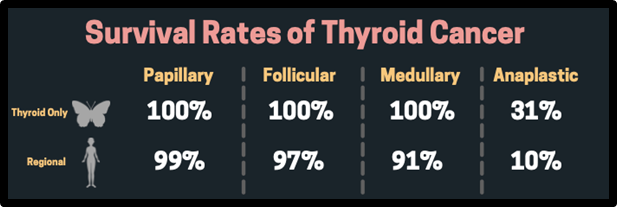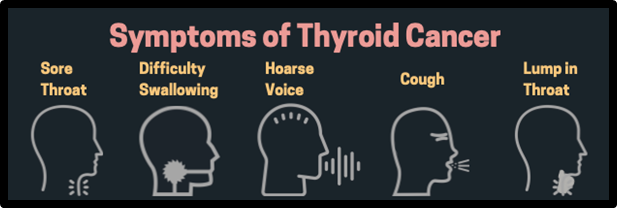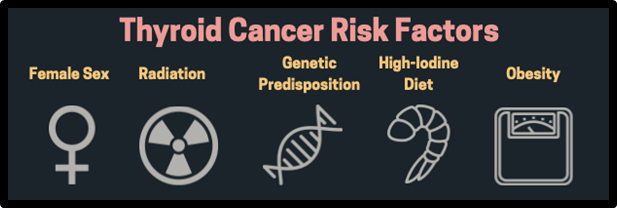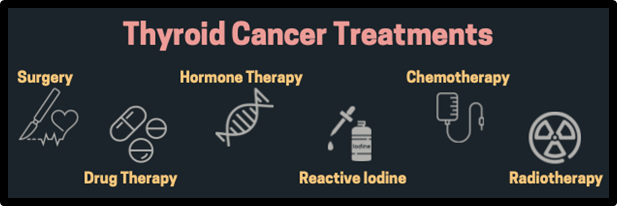Spotlight On: Thyroid Cancer
So far, as part of Thyroid Awareness Month, we have covered some of the main problems that can arise in your thyroid. An over- and under- abundance of thyroid hormones are the main culprits, but there is an obvious other that we purposely left out.
The importance of raising awareness of thyroid cancer is the reason that we have left it for its own week. So, this week we are focussing on thyroid cancer: its types, symptoms, risk factors, diagnosis and treatments.
Types of Thyroid Cancer
There are 4 types of thyroid cancer: Papillary, Follicular, Medullary and Anaplastic.
The most common is Papillary, which usually displays no symptoms at all. Despite being very difficult to detect, Papillary Thyroid Cancer has a 99% survival rate after 5 years even once spread to other parts of the body (known as regional cancer).
Follicular and Medullary Thyroid Cancers also have very high survival rates – 97% and 91% when regional. Anaplastic Thyroid Cancer, however, has a survival rate of just 31% when contained to just the thyroid – dropping to 10% if regional.
Fortunately, Anaplastic Thyroid Cancer is the rarest version, accounting for only 1-2% of all cases.
Symptoms of Thyroid Cancer
The most common symptom of thyroid cancer is a lump around the neck where the thyroid is located, known as thyroid nodules.
Thyroid nodules (lumps) are harmless 99% of the time, but it is important to get any new lumps (anywhere) checked over as soon as you notice them. An expert will be able to tell using ultrasound and MRI scans whether your lumps are cancerous – but only if you ask!
Other symptoms include a hoarse voice, sore throat and pain or difficulty swallowing.
Risk Factors for Thyroid Cancer
Women are three times as likely as men to develop thyroid cancer, but anyone of any gender can get it. Radiation can also increase a person’s risk, particularly if conducted around the neck area.
Genetic predispositions are an uncontrollable risk factor. A family history of thyroid-related illnesses and other hormone dysfunctions can increase your likeliness of developing thyroid cancer.
Lifestyle choices such as obesity and high-iodine diets can also increase our risk of developing thyroid cancer – but luckily these factors are more controllable.
Diagnosis of Thyroid Cancer
If they suspect thyroid cancer, your doctor will initially conduct blood tests. If these come back positive, they will probably send you for the scans we mentioned earlier.
To finally diagnose thyroid cancer, a laboratory will conduct a biopsy of some cells collected from your thyroid. It is also this stage that determines which type of thyroid cancer it is (if the biopsy results show cancerous cells at all).
Treatment for Thyroid Cancer
The most common treatment for thyroid cancer is surgery to remove the nodules, which may or may not include part of or the entire thyroid gland.
After a thyroid removal, you would probably be prescribed hormone therapy to replace the missing hormones and kill the remaining cancer cells. Radioactive iodine might also be used to kill any remnants of cancer.
Ironically, radiation therapy is sometimes recommended where surgery is not possible, as is chemo- and drug therapy.
Thyroid Cancer: Catch it Early
If you think that you or a loved one might be showing any of the symptoms of thyroid cancer, make an appointment to see your doctor. Catching cancer early gives you the best chance of survival, and your doctor will be able to refer you to a specialist if necessary.
Felicity Thompson
and






